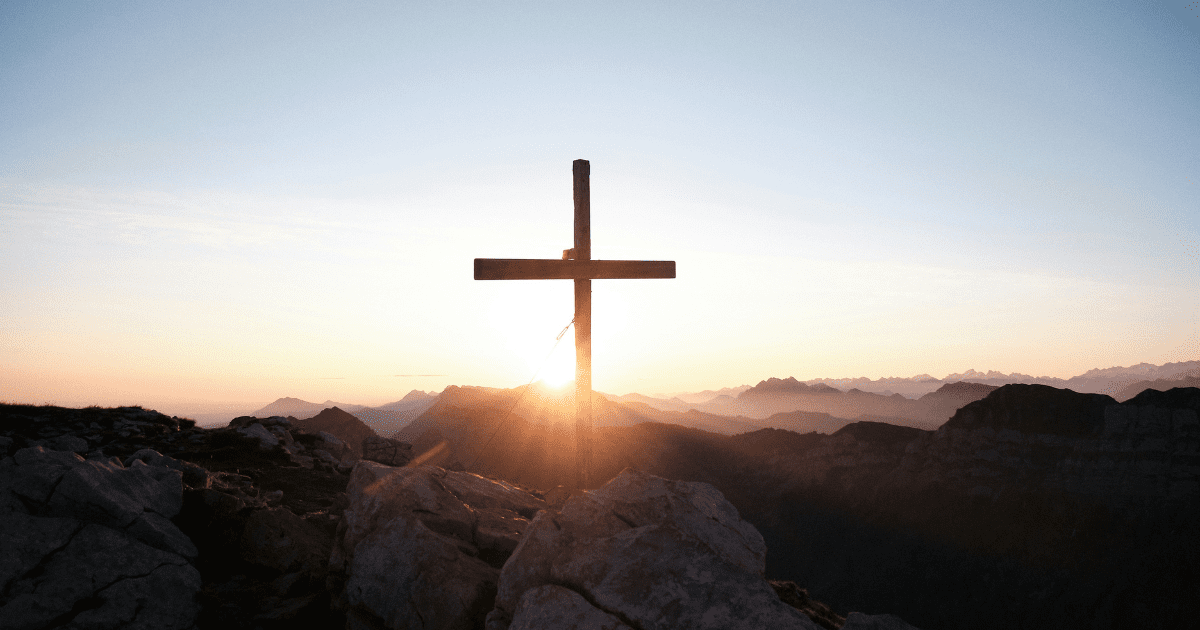By Edward Murray
How could that Friday be good?
Let’s be honest: to call the day of Jesus’ crucifixion “good” is counterintuitive and sounds odd to the watching world. How can we call a day marked by suffering and mourning “good”? How can we say that a bloody cross is “good”?
Yet, this day most definitely is good, because it marks the most powerful and momentous weekend in history! This is the weekend that all of history points to – where the world was changed forever!
On this day a couple millennia ago, Jesus paid for our sins and rose from the dead, showing the world that the grave has no hold on him. Moreover, for those who are marked by Christ, his resurrection serves as an eternal receipt, proving that their debt is completely paid.
Without the cross, there is no gospel
You can’t have Christianity without the cross. Sure, Jesus is a great teacher, whom we must learn from and model our lives after, but if we don’t have the cross, we don’t have the gospel. If we don’t have a real resurrection of the eternal Son of God in bodily form, occurring in real-time history, then everything is meaningless.
“You can’t have Christianity without the cross.”
Spanning the gospels, one will find various angles recorded of the cross. Yet, in one account recorded by the apostle John, we see Jesus lifting the battle cry that Good Friday points to: “It is Finished!” Not only is THIS the most relieving statement anyone has made in history, but it’s quite possibly the most powerful sermon ever preached, and only with three words.
“…So they took Jesus, 17and he went out, bearing his own cross, to the place called The Place of a Skull, which in Aramaic is called Golgotha. 18There they crucified him, and with him two others, one on either side, and Jesus between them. 19Pilate also wrote an inscription and put it on the cross. It read, “Jesus of Nazareth, the King of the Jews.” 20Many of the Jews read this inscription, for the place where Jesus was crucified was near the city, and it was written in Aramaic, in Latin, and in Greek. 21So the chief priests of the Jews said to Pilate, “Do not write, ‘The King of the Jews,’ but rather, ‘This man said, I am King of the Jews.’” 22Pilate answered, “What I have written I have written…”
28After this, Jesus, knowing that all was now finished, said (to fulfill the Scripture), “I thirst.” 29A jar full of sour wine stood there, so they put a sponge full of the sour wine on a hyssop branch and held it to his mouth. 30When Jesus had received the sour wine, he said, “It is finished,” and he bowed his head and gave up his spirit.” John 19:16-30 (ESV)
The Christian’s rest and relief extends into eternity
One of the hardest things I’ve ever accomplished in life was when I earned my master’s degree. Of course, suffering is relative, but academics don’t come naturally to me. I had to work very hard to get to graduation. And I can still recall how I felt the day I walked across the stage to receive my degree and relish knowing it was finished! Whatever relative turmoil and trial any of us have faced in life to arrive at a proverbial finish line, Jesus’ “finishing” takes that temporal rest and relief, multiplies it by infinity, and extends it to eternity!
In our passage, one of the key things to focus on is the apostle’s recording in v. 28: “After this, Jesus, knowing that all was now finished, said (to fulfill the scripture), ‘I thirst.’”
What does John mean when he says that this scene occurred to ‘fulfill the scripture’?
To answer this question, John alludes to Psalm 22 with Jesus’ reception of sour wine and his garments being divided. However, one of the most significant elements of this passage comes from John’s mention of the hyssop branch (v. 29).
Don’t miss the significance of these elements leading us towards Jesus’ final breath that Friday. With the hyssop branch, John points us to the primary aim of Christ’s mission. It reminds us of the atoning blood sprinkled during Israel’s Passover celebration: God required blood to cover his people, so that their blood wouldn’t be required as the cost for their sins.
In Exodus 12:22, we read about the first Passover. In order to escape the penalty of the final plague, God’s people were to “take a bunch of hyssop and dip it in the blood that is in the basin, and touch the lintel and the two doorposts…” Additionally, this was likely David’s allusion when he confessed, “Purge me with hyssop, and I shall be whiter than snow.” (Psalm 51:7)
At the Passover, the threat of judgment – a final plague – loomed over all the people, both Egyptians and Israelites. It didn’t matter which people group they belonged to. To escape wrath, the blood of an unblemished lamb was required by hyssop to paint the entrance to one’s house.
By turning to Jesus, you can look to that Friday and say, “It is Finished! It is complete! My debt has been paid, and my sin is atoned for!”
There are only two options:
(1) You pay the penalty of the plague.
or…
(2) A substitute pays the penalty of the plague.
To put this another way, when Jesus received the sour wine with hyssop, the Lord of the universe proclaimed that he finished in real time what the Passover only pictured and typified.
You and I have an eternal debt that we cannot pay. We have sinned before the Holy Eternal Triune God of the universe, but Jesus’ proclamation is that he has finished his work, and the threat of judgment can be spared and atoned for if you look to him as your substitute. By turning to Jesus, you can look to that Friday and say, “It is Finished! It is complete! My debt has been paid, and my sin is atoned for!”
And, keep in mind, Jesus doesn’t say that it is potentially finished, but that it is actually finished! Elaborating on this would take a whole other series, but for now, it can be said that this is a beautiful mystery. Jesus fully atoned for the sins of his people over two thousand years ago, and on that day, when he said, “It IS finished!” he declared this for all who ever have and ever will call on him.
“Believe this, rest in this, and proclaim this!”
The worst day in history was the best day in history
That Friday was good! And this coming Friday, when we look back to his crucifixion, we can mourn the sin of the world and the punishment it deserves, while at the same time proclaiming the goodness of that day.
Dear Christian, remember the truth this week. Believe this, rest in this, and proclaim this! At the cross, Jesus completed the task and proclaimed that it is finished!
And when you’re done remembering Friday, remember that he rose on the third day, which changes everything.

Edward Murray currently serves as Manager of Special Projects and Policy Research for Classical Conversations® and The Homeschool Freedom Action Center. He is a native of Augusta, GA, and an alumnus of Reformed Theological Seminary in Charlotte, NC, where he earned his M.Div. He lives in Newport News, VA, with his wife and three children.
